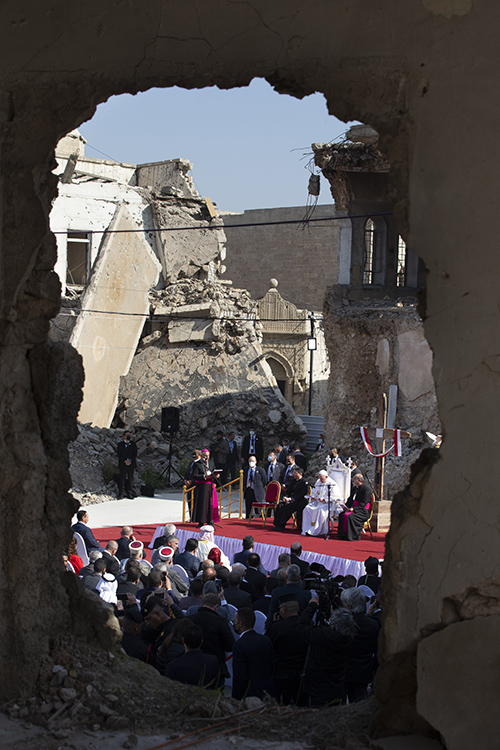Pope Francis was born on December 17, 1936, is 84 years old, and has commented that he does not enjoy traveling. However, following the rules of prudence due to the pandemic, he 'let himself' be convinced by the Iraqis, civilians and religious, and has lived with dedication his trip to the land of the prophet Abraham. As he said before leaving, "I couldn't let them down a second time." in allusion to St. John Paul II, who was unable to begin the Jubilee of the year 2000 in Iraq for political reasons.
He came back from the trip exhausted, but happy. "I traveled to Iraq knowing the risks, but after much prayer, I made the decision freely. It was like getting out of prison, he pointed out on the plane. The stay of the Common Father of Catholics in Iraqi lands leaves us with important lessons. Perhaps the first is this: think of others, of the Iraqi people.to travel even though everything seemed to be against them, to go to comfort and console them. A work of mercy.

The second is compassion. The Vicar of Christ has behaved like Jesus before resurrecting the son of the widow of Naim, or seeing the crowds who had nothing to eat, or like the Father who sees the prodigal son coming. A few years ago, in October 2015, shortly before the convocation of the Holy Year of Mercy, the Pope said in Santa Marta: God. "he has compassion, he has compassion for each one of us; he has compassion for humanity and has sent his Son to heal it."
Compassion beats at the heart of the prayers that the Pope prayed on the plains of Nineveh and Ur, for so many people, especially Christians, who have suffered from the suffering of their faith. "the tragic consequences of war and hostility".
It was in Mosul that the Pope spoke of cruelty: "It is cruel that this country, the cradle of civilization, has been hit by such an inhuman storm, with ancient places of worship destroyed and thousands and thousands of people (Muslims, Christians, Yazidis and others), forcibly evicted and killed.". Hours later, on the flight back to Rome, he would tell reporters: "I did not imagine the ruins of Mosul, I was speechless." The photos are really impressive.
"We have to forgive."
There, in Hosh-al-Bieaaa, the square of the four churches (Syriac-Catholic, Armenian-Orthodox, Syriac-Orthodox and Chaldean), destroyed between 2014 and 2017 by terrorist attacks, Francis solemnly affirmed that. "fraternity is stronger than fratricide, hope is stronger than death, peace is stronger than war.". "This conviction can never be silenced in the blood shed by those who profane the name of God by walking paths of destruction."
Last but not least (last but not least), forgiveness. "Almighty God, open our hearts to mutual forgiveness, make us instruments of reconciliation."prayed on Saturday in the ancient Ur, together with a hundred representatives of Judaism, Islam and Christianity, at the historic interreligious meeting.
"A woman who lost a son in the first bombings in 2014 said one word: 'Sorry, I forgive them.' And she asked forgiveness for them. That was what touched me the most, the testimony of a mother in Qaraqosh." revealed the Pope on the plane returning to Rome, says correspondent Juan Vicente Boo at ABC. "This word, forgiveness, we have lost it. We know how to condemn in a big way, and I am the first. We have to forgive. This was what impacted me the most in Qaraqosh."
Journalist and writer. Graduate in Information Sciences from the University of Navarra. He has directed and collaborated in media specialized in economics, politics, society and religion. He is the winner of the Ángel Herrera Oria 2020 journalism award.







